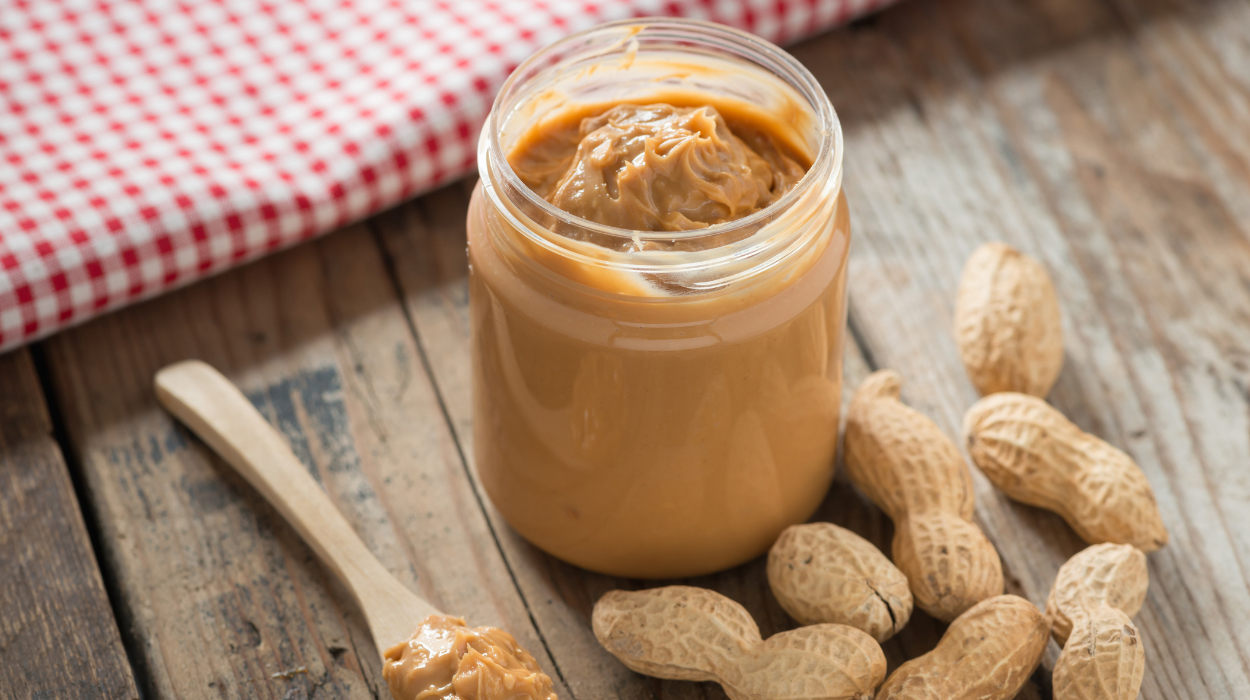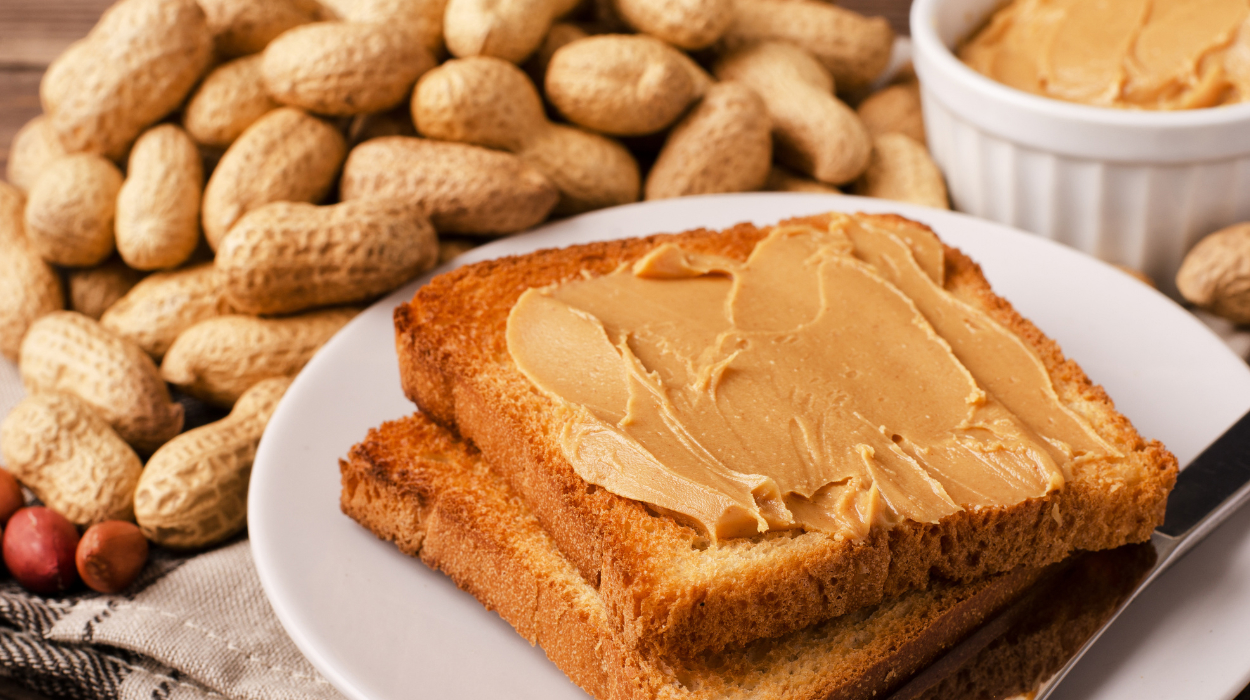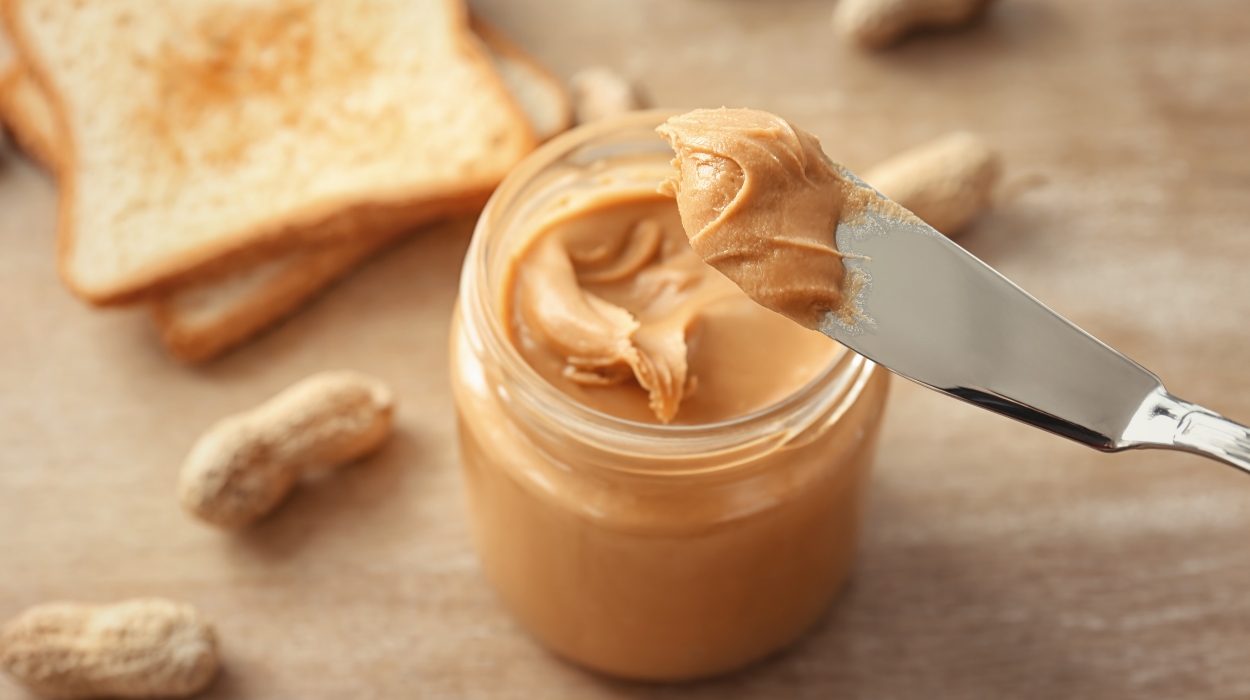Peanut butter has a delectable taste and texture. It’s creamy, savory, and delightful. It enhances the flavor of practically any food it is added to and has a wealth of nutrients. It’s no surprise that peanut butter is found in almost every pantry in the U.S.
Given its popularity, you may be wondering, is peanut butter good for weight loss? Evidence suggests that this delicious spread stands out from other healthy foods to eat to lose weight due to its high protein and nutrient content. In this article, let’s determine whether peanut butter helps with weight loss.
Is Peanut Butter Good For Fat Loss?
Yes, as long as you limit your intake, peanut butter can aid in weight loss.
Not only is peanut butter delicious in many dishes, it’s also packed with beneficial nutrients. Because of its low carbohydrate content, high protein content and healthy fats, it can be a nutritious addition to any weight loss diet.
Be careful not to overindulge in peanut butter as it is calorie-dense and could sabotage your weight loss goals. Look out for hidden sugars and other additives by reading labels.
Is Peanut Butter Good For Weight Loss?

Peanut butter can help you lose weight, but it all depends on what type and how much you eat.
Peanut butter has few carbohydrates, plenty of protein, and healthy fats. You may find that you eat less high-calorie junk food and snacks after eating peanut butter since it makes you feel full for longer. Thus, when eaten in moderation, peanut butter does not contribute to weight gain.
Nutritional Value Of Peanut Butter
Peanut butter is appealing for many reasons beyond its delicious flavor. Plant-based[1] nut butter is gaining in popularity due to its high nutritional content.
Peanut butter may be helpful in weight management since it contains protein, fiber, and healthy fats. These nutrients aid in weight loss in the following ways.
Protein
As a plant-based food, peanut butter is rich in protein.[2] There are 3.6 grams[3] of protein in just one tablespoon or 16 grams of natural peanut butter.
In addition to aiding in tissue repair and growth, protein can make you feel full on fewer calories. A study conducted in 2020 found that protein enhances satiety signaling[4] in the brain.
To build and maintain muscle, it is essential to consume enough protein. Muscle mass is associated[5] with metabolism and weight loss. When you stop working out or lose muscle, your metabolism slows down. This makes it harder to lose weight.
Therefore, a healthy diet that is abundant in protein may be more effective in promoting weight loss than an equivalent diet that is low in protein.
Healthy Fats
Many fats found in peanut butter are potentially good for you because they are the unsaturated type. This means that the fats are good for your heart and may help lower bad cholesterol and the risk of cardiovascular disease.[6]
A tablespoon of natural peanut butter has about 8 grams of fat.[7] It also contains oleic acid, which some research suggests can help control hunger and satiety.[8]
A separate study[9] found that people who were overweight reported much less hunger and a considerable increase in fullness after eating meals that contained oleic acid. Additionally, after eating meals high in oleic acid, there was a marked reduction in prospective food consumption.
Fiber
When it comes to dieting and losing weight, dietary fiber[10] is crucial since it promotes digestion and helps balance blood sugar levels after meals. With 1.5 grams[11] of fiber in just two tablespoons, peanut butter provides around 5% of the recommended daily allowance for fiber.
Peanut Butter Nutritional Profile:
In addition to the nutrients already mentioned, peanut butter is packed with numerous other important macro and micronutrients that enhance general health.
Two tablespoons, or 32 grams[7], of ordinary peanut butter has the following nutrients:
- Energy – 191 Kcal.
- Carbohydrates – 7.14 grams.
- Proteins – 7.2 grams.
- Fats – 16.4 grams.
- Zinc – 0.813 milligrams.
- Iron – 0.554 milligrams.
- Magnesium – 54.1 milligrams.
- Calcium – 15.7 milligrams.
- Copper – 0.134 milligrams.
- Phosphorous – 108 milligrams.
- Potassium – 180 milligrams.
- Sodium – 137 milligrams.
- Selenium – 1.31 micrograms.
- Vitamin E: 2.92 milligrams.
Peanut Butter Keeps You Sated For Longer
Since peanuts and peanut butter tend to make you feel full for longer than other foods, they could be useful in your weight loss efforts.
Peanut Butter Boosts Energy
Peanuts are an energy-dense food[12] because they have high energy content for comparatively low intake levels. For individuals in need of essential nutrients, peanuts are a good option because the majority of their fat is heart-healthy monounsaturated fat.
Peanut butter may help to maintain your energy and satisfaction all day long. This way, curbing cravings allows you to adhere to weight loss diets more easily.
Other Health Benefits Of Peanut Butter

In addition to being a delicious spread, peanut butter is a healthy addition to your diet. Besides helping people lose weight, it has additional health benefits including the presence of the following:
Phytosterols
Studies have shown that ground peanuts are a rich source[12] of flavonoids, phytosterols, phenolic acids, and resveratrol. Since peanut butter is made using processing methods such as boiling or roasting nuts and seeds, the concentration of these helpful chemicals may increase.
Phytosterols are substances that occur naturally in plants. This chemical compound is thought to promote longevity, prevent certain ailments, and restrict the body’s absorption of excess cholesterol.[13]
So, when eaten in moderation, peanut butter can be a healthy addition to a diet that guards against excessive cholesterol production and obesity.
Antioxidant Properties
Antioxidants are essential for maintaining good health because they neutralize free radicals.
Free radicals are chemicals produced by the body that can cause cell damage and homeostatic disturbance. Metabolic activities and environmental toxins are two major sources of free radicals,[14] which can injure cells, accelerate aging, and cause chronic illnesses. Consuming antioxidant-rich foods, such as peanut butter, can help avoid this type of cell and tissue damage.
Furthermore, peanut butter can promote overall health, reduce inflammation, and strengthen immune systems. The combination of resveratrol[15] and vitamin E in the nuts enhances peanut butter’s antioxidant properties, strengthening the body’s defenses against oxidative stress and other health issues.
Maintains Healthy Blood Sugar Levels
Obesity and diabetes both have their roots in persistently high blood sugar. Incorporating peanut butter into your diet can be a delicious and healthy way to lower your blood sugar levels.
Protein, healthy fats, and a low glycemic index of 14[12] are among the reasons why peanut butter is good for you. Lower glycemic index foods are digested slower and release sugars into the bloodstream slower, leading to more stable blood sugar levels during digestion.
Boosts Digestive Health
Dietary fiber, most of which is insoluble,[12] is abundant in peanut butter, making it a nutritious food choice. For regular bowel movements, healthy digestion, and relief from constipation, insoluble fiber is a great choice.
Enriched With Minerals And Vitamins
A variety of vitamins and minerals, including magnesium, phosphorus, vitamin E, niacin, and calcium, can be found in peanut butter. These nutrients are important for a variety of bodily functions, including energy production, skin and bone health, and immune system function.
How To Eat Peanut Butter To Lose Weight
Follow these guidelines to make peanut butter a more sustainable part of your regimen to lose weight.
Portion Control
To avoid eating too much peanut butter, it is important to pay attention to serving quantities. Instead of scooping a couple of huge spoonfuls of nut butter onto your plate or devouring it straight from the jar, try measuring out a serving, say 2 tablespoons.
Pick Natural Options
Eating natural peanut butter won’t hinder your weight loss efforts. The ideal method to enjoy peanuts is to eat them whole, unprocessed. But making peanut butter makes eating peanuts much more convenient and appetizing. Choose the best nuts for weight loss by prioritizing options with a few additives whenever possible.
Pair Wisely
Peanut butter is a great complement to nutrient-dense, low-calorie dishes. Here are a few ways to enjoy peanut butter:
- Add it to oatmeal or whole grains.
- Use it as a veggie dip.
- Use it in smoothies.
- Add to pancake mixes.
- Use it as a fruit dip.
- Add it to salads.
- Add to yogurt.
Conclusion
So, is peanut butter good when dieting for weight loss?
Even though peanut butter contains fat and is high in calories, it can aid in weight loss. Peanut butter alone is not a fat burner. However, when used in moderation, peanut butter can be a nutritious complement to a balanced diet for weight loss.
Although it is low in carbohydrates, it is rich in protein and healthy fats, among other nutrients. Ultimately for the most effective weight loss regimen, combine a healthy diet with foods such as peanut butter with regular exercise to completely shift towards a more active lifestyle.
Frequently Asked Questions
In moderation, peanut butter can be a healthy snack for weight loss since it is rich in protein and healthy fats. These make you feel full longer and may support a healthy diet plan.
Despite its protein and healthy fat content, peanut butter does not reportedly reduce belly fat. You need a balanced diet and frequent exercise to lose belly fat. Foods that burn belly fat are influenced by lifestyle decisions.
Yes, eating reasonable amounts of peanut butter daily provides nutrients for a balanced diet. However, limit portion sizes to reduce calorie intake.
Those allergic to peanuts should avoid peanut butter. Doctor approval is recommended when on some medications or diet pills. The same should be done before administering it to babies to avoid choking. Low-fat dieters should also be cautious.
Yes, but only in moderation. Rich in protein and healthy fats, peanut butter helps you feel full for longer. Portion control is essential for weight loss because it’s high in calories.
 Evidence Based
Evidence Based
